Xinhua News Agency, Hangzhou, October 3rd (Reporter Tian Guangyu, Liu Jinhui, Niu Mengtong) On October 2nd, the table tennis competition of Hangzhou Asian Games ended in the gymnasium of Gongshu Canal Sports Park in Hangzhou, and Guoping won six gold medals outside the women’s doubles event. Although it failed to win the gold medal in two consecutive Asian Games, table tennis still showed its strong dominance in five Olympic events. In addition to the traditional strong teams of China, Japan and South Korea, Iran, India, Thailand and other teams also performed brilliantly in this tournament, making a historic breakthrough, and the Asian table tennis world is thriving.
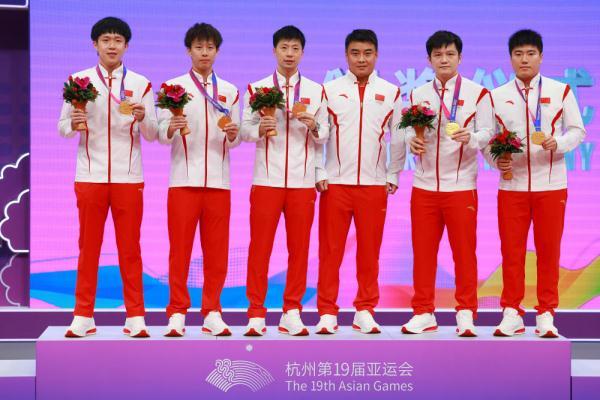
On September 26th, members of China team who won the men’s table tennis team in Hangzhou Asian Games celebrated on the podium. Xinhua News Agency reporter Liu Xushe
Compared with table tennis in Paris Olympic Games, there is no doubles in the team competition of Hangzhou Asian Games, and men’s and women’s doubles are separate events. As the "senior high school entrance examination" for preparing for the Paris Olympics, Guoping’s performance in the five events of men’s and women’s groups, men’s and women’s singles and mixed doubles is particularly important.
The men’s and women’s teams in China played the triumphant song all the way from the group stage, and all reached the summit with five 3-0 matches, achieving eight consecutive championships and five consecutive championships in the Asian Games respectively. In terms of singles, Fan Zhendong and Wang Chuqin, the top two players in the world, won the men’s singles competition and joined the finals. Sun Yingsha beat Hayata Hina, the Japanese main player, in the women’s singles final, and kept winning 11 games against her opponent. In the mixed doubles event surrounded by strong enemies, China joined forces in the final, and Wang Chuqin/Sun Yingsha defended the Asian Games after defending the World Table Tennis Championships in Durban.
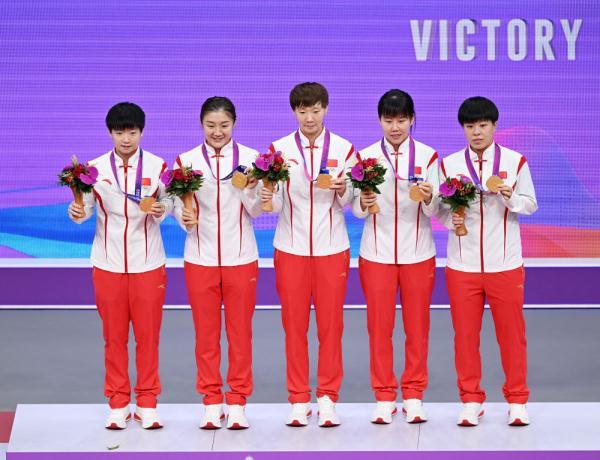
On September 26th, China team members who won the women’s table tennis team in Hangzhou Asian Games celebrated on the podium. Xinhua News Agency reporter Wang Peng photo
In two non-Olympic events, Guoping showed a happy and a worried performance. Fan Zhendong/Wang Chuqin showed great technical strength in the men’s doubles final, and won the championship by beating the Korean group Zhang Yuzhen/Lin Zhongxun in just 32 minutes. Sun Yingsha/Manyu Wang and Chen Meng/Wang Yidi, both women’s doubles teams, stopped in the quarter-finals, and China missed the medal in this event.
Although the loss in women’s doubles was unexpected, it also sounded the alarm for national table tennis, but it had little impact on the situation of the Paris Olympic Games. In the Olympic table tennis team competition, each team has only three players and adopts the best-of-five system, including four singles and one doubles. Because there are far more singles than doubles, doubles are usually paired by two singles players. Among the opponents who beat the women’s doubles in table tennis, the Japanese combination Miyo Muhara/Miyo Zhang is still young, and it is not known whether they can play the main role in singles in the strong Japanese women’s team in the short term, while the doubles strength of the Indian combination Sutil Ta/Aisika mainly comes from the "strange board" cooperation, and their singles ability is not enough to pose a threat.
In addition to the gold medal, the excellent performance of many national table tennis players in the intensive schedule is also worthy of recognition. Wang Chuqin and Sun Yingsha, who are also four events, started the "Devil’s Race" after the team competition, and played 10 games each in three days from September 28th to 30th. In the end, Wang Chuqin became the "four gold kings", and Sun Yingsha also won three gold medals, which proved that the two "post-00 s" were worthy of great responsibilities in the national table tennis team.
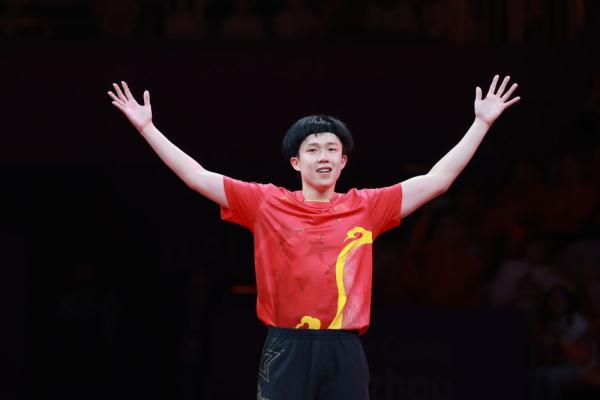
On October 2nd, Wang Chuqin celebrated his victory after the game. Xinhua News Agency reporter Liu Xushe
When talking about the concurrent experience, Sun Yingsha said: "Because the events I participate in are different, it is very important to change my energy during the day. For example, my position in mixed doubles and women’s doubles is different, which requires mental adjustment and strain."
In this Asian Games, Japan and South Korea are still the strongest opponents of table tennis.
The Japanese women’s team, which was composed entirely of "post-00 generation", played well, and staged a peak confrontation with the China women’s team in the team final, playing what Ma Lin, the head coach of the national table tennis women’s team, thought was "the most intense match in recent times". Hayata Hina, the number one Japanese women’s singles, was in a hot state. She defeated the second seed Wang Yidi of China 4-3 in the semi-final and lost to Sun Yingsha to win the silver medal in the final. 19-year-old Miyo Muhara and 15-year-old Benmei Zhang, together with this young partner, beat China’s Sun Yingsha/Manyu Wang in the women’s doubles quarter-final and finally won the bronze medal in the women’s doubles. There is no doubt that this young Japanese women’s team will be the strongest opponent of China women’s team in the future.
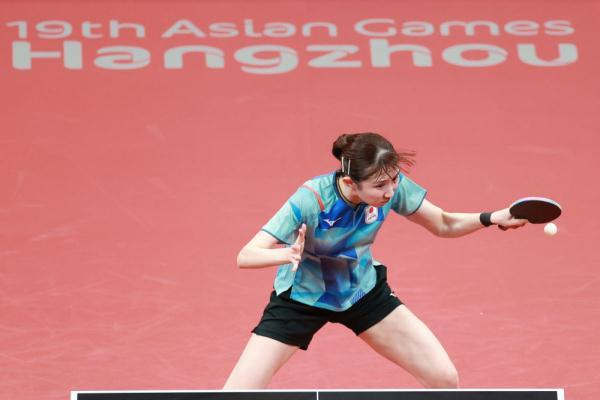
On October 1st, Hayata Hina was in the competition. Xinhua News Agency reporter Liu Xushe
Although there is no doubt about the strength of the Japanese men’s team, it seems that they have won the "quarter-finals" and "Iran team" in this competition. The men’s team was unexpectedly eliminated by Iran in the quarter-finals, while the only remaining Panasonic Daxing/and Chuan Ruiji lost to Iranian brothers Aramian/Aramian in the men’s doubles quarter-finals. Zhang Benzhihe, who had high hopes, first lost to China’s Lin Gaoyuan/Wang Yidi in the mixed doubles quarter-final with Hayata Hina, and then suffered a cramp in the men’s singles quarter-final, which was reversed. In the end, the Japanese men’s team ended the journey of the Asian Games.
In recent years, the Korean team has been deeply involved in doubles events and gained a lot in this Asian Games. Tian Zhixi/Shen Yubin won the gold medal in women’s doubles, Zhang Yuzhen/Lin Zhongxun won the silver medal in men’s doubles, and Lin Zhongxun/Shen Yubin and Zhang Yuzhen/Tian Zhixi won two bronze medals in mixed doubles for South Korea. Although the South Korean team, which is weak in singles, seems to be lame, it is expected to make a breakthrough in doubles and make a difference in the Paris Olympic Games.
In addition, some "non-traditional strong teams" have sprung up in this Asian Games and made historic breakthroughs. Aramian and Aramian, brothers, won the first bronze medal in men’s doubles in the Asian Games for Iran. The Iranian men’s team led by them eliminated the Japanese team and won the bronze medal in the men’s team again after 65 years. Indian women’s doubles Sutil Tower/Aisika won the first bronze medal of Indian women’s doubles in the Asian Games. The bronze medal of the Thai women’s team also created the history of table tennis in Thailand.
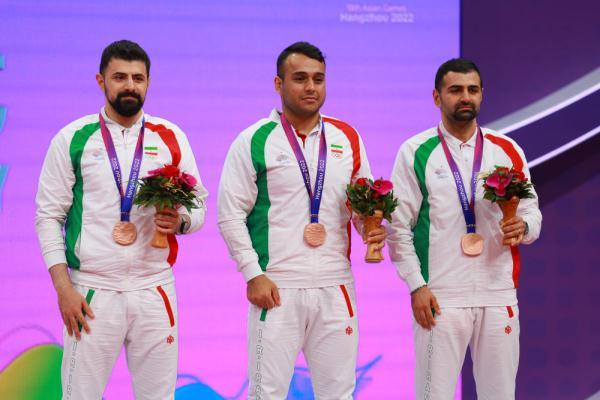
On September 26th, Iran, the third runner-up of men’s table tennis team in Hangzhou Asian Games, was on the podium. Xinhua News Agency reporter Liu Xushe
Petra Sorin, president of ITTF, said: "The table tennis competition in the Asian Games reflects the vigorous development of this sport in Asia. Table tennis is attracting more audiences with its energetic and exciting charm. "
The table tennis competition in Hangzhou Asian Games is not only a venue for table tennis players from various countries (regions) to compete for gold and silver, but also a stage for achieving legendary stories. Malone, the "four-dynasty veteran" of the Table Tennis Asian Games, made a full appearance in the team competition, and "sealed the opponent" five times. After the game, the sentence "This should be my last Asian Games" was a breakthrough. Iranian player Aramian and his teammates created Iranian table tennis history twice. He overcame the difficulties brought by hand diseases and the story of practicing backhand skills was moving …
After the Asian Games, Asian table tennis athletes have looked to Paris, expecting to fly their dreams in the Olympic Games and write a new history of Asian table tennis.
Source: Xinhua News Agency